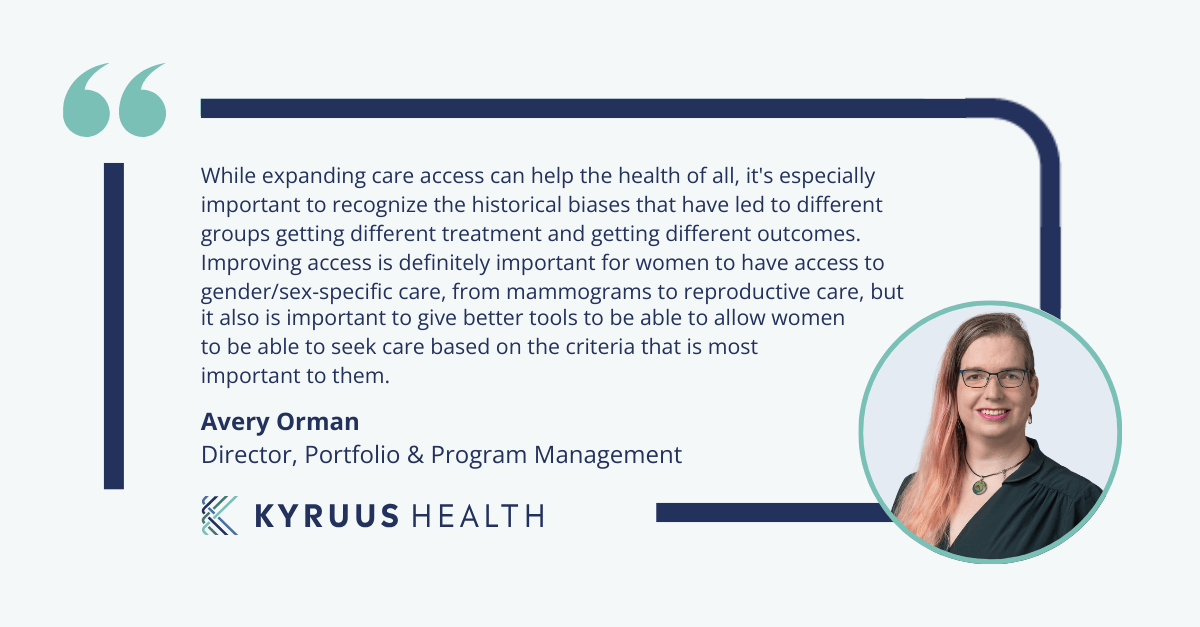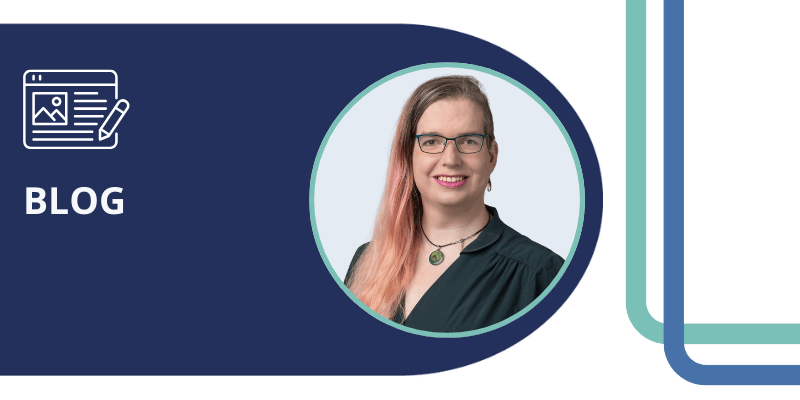In honoring Women’s History Month, Kyruus Health is proud to amplify the voices within our vibrant community. This series, “Celebrating Women: Voices from our Kyruus Health Community,” unfolds a tapestry of stories that weave through the unique journeys of our Kyruunauts, Board of Directors, and customers.
By sharing these narratives, we aim to foster a deeper understanding of the rich mosaic of women experiences, resilience, and contributions within Kyruus Health. As we navigate identity and care access, these insights serve as beacons, guiding us toward a more inclusive, equitable, accessible, and compassionate healthcare landscape.
Join us in celebrating the diverse voices that shape Kyruus Health, embodying the spirit of unity, strength, and shared humanity — continuing with Avery Orman.
Avery Orman
Director, Portfolio & Program Management
Tell us a bit about your background and the story of how you came to be connected to Kyruus Health?
I started my career in the video games industry as a software engineer, but eventually found project & program management. It was one area where I could have a broad based impact in an area where being able to help communicate between technical and non-technical teams was a big advantage.
I found Kyruus Health after wanting to find a new industry and the concept of helping connect people to the right care really resonated with me. I have a few chronic conditions that have impacted me across my life and finding good specialists has definitely been a challenge! I’m really happy to be helping people get easier access to the right care, and definitely has been a good move for me personally.
How would you describe your experience with this identity?
Over the years, I’ve definitely had a bit of an uncommon perspective and experience having been seen as a woman but not at the start of my career. I’ve definitely appreciated the inclusive nature of the places that I’ve worked, but have also gotten to see first hand the difference that your perceived gender can make in how you move about the world from both sides of the spectrum. What started as a vague discomfort and feeling like I wasn’t able to genuinely connect as the other boys and men in my life seemed to be able to do suddenly made sense when I saw things from a new perspective.
Transitioning wasn’t easy, especially when dealing with other people’s opinions, but in the end it’s been totally worth it, as I’ve been able to be not only happier but also it’s allowed me to relate to other people in ways that feel much more genuine and much more ‘me’. Even with all of the expectations that come with being a woman (much less being trans), it’s allowed me to not only express myself more fully but also allowed me to work in community in ways that always felt awkward and stilted at best before. It definitely comes with a number of challenges and drawbacks, but no matter the social and regulatory hurdles that get thrown up, life is too short to pretend to be something that isn’t working for you.
The community of women that exists today is definitely standing on the shoulders of giants that have fought for equal rights and recognition in the past, and it’s humbling to think about the long history of challenges and progress that have taken place to allow as much progress as we’ve gotten so far. There’s still plenty of work to be done moving forward, but we’ve come a long way.

What is something about you that you want others to know more about?
No matter who you are, what we have in common is almost always greater than what divides us. We all want to be safe, healthy, be able to freely express ourselves, and have opportunities for success. We take the time to highlight some differences to ensure that we’re understanding each other, but in many cases the differences and divisions are perceived as much larger than they actually are.
Secondly, when looking either at history or the path forward, it’s important to keep an intersectional lens — the experience of womanhood has a lot in common across all groups, but there are also unique challenges for women of color, disabled women, queer women, etc. There’s so many resources out there today where one can learn about the many women throughout history that have had a huge impact on our world today, as well as learning about the current experience of groups one might not be a part of. Sharing our stories and learning about people different from us can be a very important and rewarding exercise, no matter who you are.
Finally, it’s worth taking some time to familiarize yourself with the current shifting regulatory & care guidance environment. There are very specific and unique challenges to women’s healthcare access & rights , transgender care access & rights at all ages, and medical research for all kinds of demographic groups. No matter your personal opinion on any one of these issues, it’s worth taking the time to reach out to people in your life that might be impacted by these decisions and see how they are doing and what impacts that these changes are expected to have on them. Doing so will ensure that we’re all up to date and able to adjust to our customer’s shifting needs in addition to being more informed about the real-world impact of these changes.
From your perspective, what does celebrating Women’s History Month mean to you?
Celebrating Women’s History Month is a great time to reflect on all of the women who haven’t gotten enough recognition, who have fought for equality, equity, and help lift up all. While we learned about a few key women throughout history in our childhood education, there are so many more women throughout history that got less recognition in our history books. It’s also a great time to learn about women in cultures and areas of the world that may be less familiar to our own backgrounds.
Celebrating women’s history month not only is a factor of celebrating the impact that women can have on history when treated as equals, but also a good time to reflect on the specific perspectives that are added when women are included in the conversation. As always we need a diverse set of people in the room to make the best decisions, and Women’s History Month is a great reminder of this.
How would you encourage your colleagues to honor and celebrate this month?
Take an area where you have benefitted from the way the world works today and learn something about the women who have contributed to making that happen, especially when looking with an intersectional lens. Too much of the history that we’re taught leaves out key people who helped our progress so far. From the initial fight to get women the right to vote, to the black women who were a key component of the codebreaking effort in WWII, the disabled women who helped drive the disability rights movement that got us the ADA, the women of color who were a key part of the LGBTQIA rights movement, and so many more than I can list in one spot…
But also take some time to reflect on the more recent accomplishments in making the world more equitable. So many women in recent history have done the hard work of breaking the glass ceiling and making it clear that leadership roles and even entire industries aren’t restricted opportunities to just 50% of the population. So many of our most recent advances have been driven by women still alive today, including many efforts that continue to this day. Learn about someone new or a piece of history that you haven’t known as much about, in addition to doing something to support the women in your life and doing something to support the women who are continuing to try to make history today.
How do you perceive the role of care access in health for women?
Historically medical research has focused on men’s bodies, or assumed that women are just slightly different modifications of a male assumed standard. These kinds of patterns have resulted in a lot of healthcare access and care quality issues over the years, some of which are still continuing to this day. Equitable healthcare access is very much aided by having a diverse set of people at the table when decisions are made, whether that comes to medical research, decisions around what types of care to offer, insurance coverage decisions, or matching the right care to the right patient. Both in terms of types of care that are generally specific to people assigned female at birth, but also the same diversity of decision making is very helpful in making sure that health access & outcomes consider all populations and demographics.
While expanding care access can help the health of all, it’s especially important to recognize the historical biases that have led to different groups getting different treatment and getting different outcomes. Improving access is definitely important for women to have access to gender/sex-specific care, from mammograms to reproductive care, but it also is important to give better tools to be able to allow women to be able to seek care based on the criteria that is most important to them. We’ve seen from studies that women are one of the groups that are commonly dismissed in their concerns, and whose pain is treated less seriously, amongst other gaps in care quality even on the types of medical issues that anyone can have. Empowering everyone to be able to search for the care that matches their priorities is a huge help in this regard, whether people are searching for a provider of a gender they feel comfortable with, someone who speaks their language, or whether the facility is wheelchair-accessible. Hopefully over time with additional improvements on research, treatment options, and provider training, we can continue to make gains in access to equitable care for all.
Anything else you want to say?
I’ve been really appreciative of working for a company like Kyruus Health that takes the time to focus on creating such a collaborative environment to ensure that we’re able to make the best decisions with a diverse set of voices. The shifting economic and regulatory environment is definitely going to continue to cause critical barriers and gaps in care for vulnerable populations, and care navigation and access isn’t going to get less complicated or less important as time goes on. It’s a good time to reach out to friends and community members to see if they have had or anticipate having healthcare access challenges in the future. The more that we can understand the real-world challenges different groups have in getting the right care at the right time, the better we’ll be able to make our products to help move the needle in improving care access in the future.



